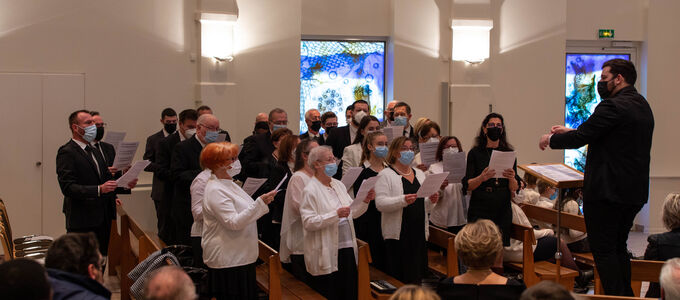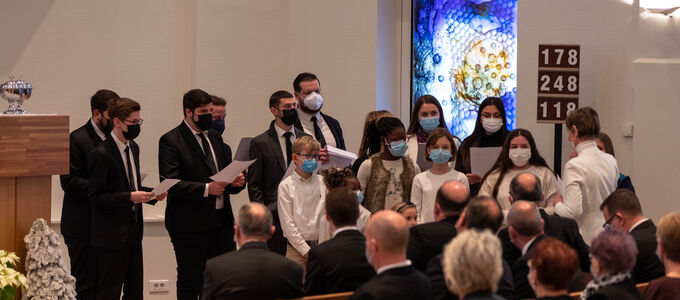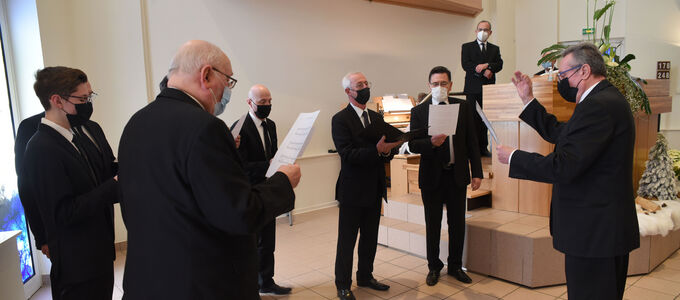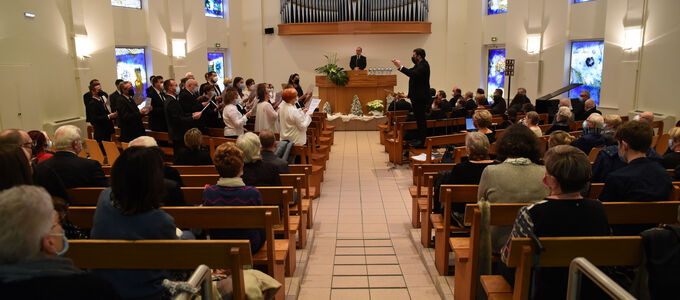
Is it possible to enjoy life and still suffer? Can we experience God with all our senses already here and now? How is either possible? Here are some answers from a divine service full of contradictions.
Chief Apostle Jean-Luc Schneider paid a surprise visit to the congregation in Mulhouse, France, on 23 January 2022. He had originally planned to be in Angola, but had had to cancel his trip on account of the pandemic.
The sermon was based on what Apostle Paul wrote to the church in Corinth: “For we know that if our earthly house, this tent, is destroyed, we have a building from God, a house not made with hands, eternal in the heavens. For in this we groan, earnestly desiring to be clothed with our habitation which is from heaven” (2 Corinthians 5: 1–2).
Did Paul despair of life?
Paul is not expressing a desire to die here, Chief Apostle Schneider made clear. “He did not want to die, and said so repeatedly.” After all, Paul had the same hope as Christians today—namely that the Lord would return in his lifetime.
Suffering as disciples of Christ
When Paul speaks of groaning it does not mean that life on earth is horrible. Of course, “we are exposed to the difficulties of life on earth, but that does not mean that life on earth must necessarily be horrible”. On the contrary: “Like everyone else, we have the right to enjoy life and all the pleasures it offers us.”
Here, Paul is rather referring to the specific suffering of those who have decided to follow Christ, the Chief Apostle explained:
- “Jesus is our reference point, and that inevitably makes us realise that we are imperfect and that we are weak.” This, precisely, is a first suffering, he said, “the suffering of those who follow Christ and who realise: I am imperfect, I am a poor sinner.”
- Those who love their neighbour will also be sensitive to the suffering of others. Part of being Christian is seeing others suffer.
- Something else that makes us suffer is the knowledge: “In this earthly body we cannot have peace with one another, we cannot have perfect fellowship with one another.”
- Today, Christians are also subject to earthly laws and are separated from those who no longer have an earthly body: “the suffering of being separated from those who have preceded us into the other world”.
- “As long as we are on this earth, we must believe in Christ, and we cannot see Him.” The fact that the earthly body does not allow for perfect fellowship with God was Paul’s greatest suffering…
The resurrection body is therefore all the more important, the Chief Apostle made clear. For only this body makes perfect fellowship with God possible.
Are tangible moments with God possible already today?
“Those who seek fellowship with Christ need a certain, I would almost say, physical communion with the Lord.” And those who seek fellowship with Him need to do concrete things; it is not enough to have beautiful thoughts.
Chief Apostle Schneider showed the congregation how it is possible to actually meet God in the flesh already today.
- It is possible for believers to hear the voice of God. It is not enough to read a text that contains beautiful thoughts. In the divine service, the believers hear the word of God, that is where it is substantial, the Chief Apostle said.
- And it is not enough to just listen. The believers need to speak with God: “And not only in their heads. They need to talk to Him and that is why they persevere in prayer.”
- Wherever possible, Christians also speak with God when they sing together.
- “We need to eat with Him, we need to feel the presence of His body. This is also the purpose of Holy Communion,” even if this idea is disturbing. The Chief Apostle explained that “our bodies need the physical experience of being close to God, and this also involves eating the body and blood of Jesus together, being in Him”.
“And soon, this is our hope and conviction, the Lord will return,” Chief Apostle Schneider said in conclusion. “What no man can explain, what no man can understand will simply take place, and we will realise that everything has changed and everything has been settled.”
















